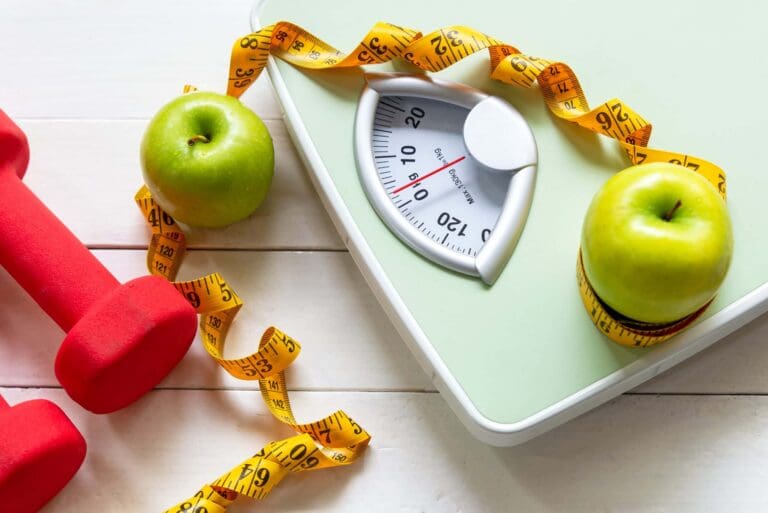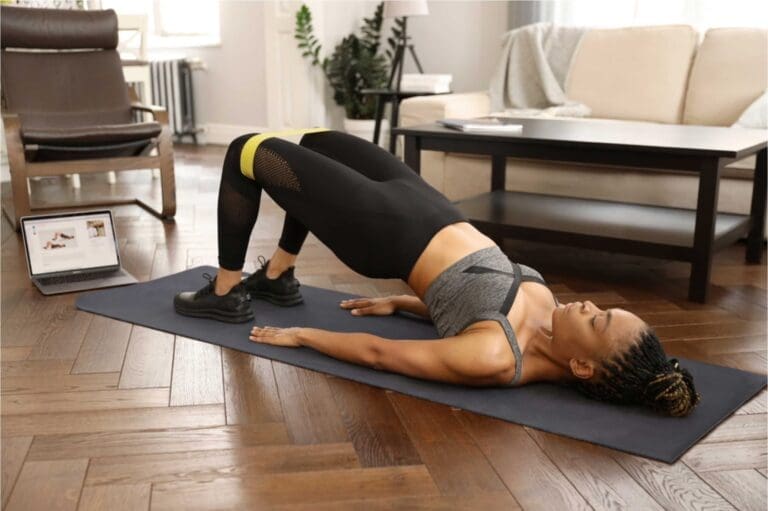We independently review everything we recommend. When you buy through our links, we may earn a commission. Learn more›
Introduction
Picture this: It’s 3 PM, and you’re staring at your computer screen, fighting the urge to nod off. Sound familiar? We’ve all been there. But what if I told you that the key to conquering that afternoon slump and boosting your overall productivity at work might be hiding in your gym bag?
Here at Holly Roser Fitness in New York City, we’ve seen firsthand how physical fitness can transform not just bodies, but careers. As a personal trainer who’s worked with countless professionals in Manhattan, I’ve witnessed the remarkable impact that regular exercise can have on workplace performance.
But don’t just take my word for it. Let’s dive into the science behind why staying fit could be your secret weapon for crushing it at the office.
The Mind-Body Connection: How Exercise Boosts Brain Power
Sharper Focus and Enhanced Cognitive Function
Ever notice how after a good workout, your mind feels clearer? There’s a reason for that. Exercise isn’t just about building muscle; it’s a full-blown brain booster.
A groundbreaking study published in the “Journal of Clinical and Diagnostic Research” found that just 30 minutes of moderate-intensity exercise can significantly improve cognitive function, including better decision-making skills and increased attention span (Mandolesi et al., 2018).
“Physical activity is associated with improved cognitive performance and enhanced brain function across the lifespan.”
This means that hitting the gym before work or squeezing in a lunchtime jog could actually help you tackle that challenging project with newfound clarity.
Stress Reduction: Your Natural Productivity Enhancer
Let’s face it, workplace stress is a productivity killer. But here’s the good news: regular exercise is like a natural stress-buster. When you work out, your body releases endorphins, those feel-good chemicals that act as natural painkillers and mood elevators.
A study in the “Journal of Occupational Health Psychology” revealed that employees who engaged in regular physical activity reported lower levels of job stress and higher levels of job satisfaction (Eschleman et al., 2019). Lower stress levels mean you’re less likely to get bogged down by workplace pressures, allowing you to maintain focus and efficiency throughout the day.
Energy Levels and Stamina: Fueling Your Workday
Combating Fatigue: The Exercise Paradox
It might seem counterintuitive, but expending energy through exercise actually gives you more energy overall. As a fitness coach, I’ve heard countless clients say, “I’m too tired to work out.” But here’s the kicker: regular physical activity can actually combat fatigue and increase energy levels.
A study published in the “Psychological Bulletin” found that sedentary individuals who started a regular exercise program reported reduced fatigue levels of up to 65% compared to groups that did not exercise (Puetz et al., 2006). Imagine tackling your workload with 65% more energy – that’s a game-changer!
Improved Sleep Quality: The Foundation of Productivity
Quality sleep is crucial for workplace productivity, and guess what? Regular exercise can help you sleep better. A study in the “Journal of Sleep Research” showed that people who engaged in moderate-intensity exercise experienced improved sleep quality and duration (Kredlow et al., 2015).
Better sleep means you’re more likely to wake up refreshed and ready to tackle your workday with vigor. It’s a virtuous cycle: exercise improves sleep, better sleep improves productivity, and increased productivity gives you more time and energy for exercise.
Physical Health: Reducing Sick Days and Presenteeism
Boosting Immune Function
Nothing derails productivity quite like getting sick. The good news? Regular exercise can give your immune system a significant boost. A study in the “Journal of Sport and Health Science” found that moderate-intensity exercise can enhance the body’s immune response, potentially reducing the risk of upper respiratory tract infections (Nieman & Wentz, 2019).
Fewer sick days mean more time at your desk, crushing your goals. But it’s not just about showing up – it’s about showing up at your best.
Combating Presenteeism: Being There vs. Being Productive
Presenteeism – being physically present at work but not fully functioning due to illness or other health conditions – can be just as detrimental to productivity as absenteeism. Regular exercise can help combat the underlying health issues that lead to presenteeism.
A study in the “Journal of Occupational and Environmental Medicine” found that employees who participated in a workplace wellness program that included physical activity showed significant improvements in presenteeism over time (Cancelliere et al., 2011).
Mental Health: The Often Overlooked Productivity Factor
Exercise as a Natural Antidepressant
Mental health is a crucial component of workplace productivity, and exercise plays a vital role in maintaining it. Regular physical activity has been shown to be an effective tool in managing symptoms of depression and anxiety, which can significantly impact work performance.
A meta-analysis published in the “Journal of Psychiatric Research” found that exercise can be as effective as antidepressant medication in treating mild to moderate depression (Kvam et al., 2016). When you’re in a better mental state, you’re more likely to engage fully with your work and collaborate effectively with colleagues.
Building Resilience: Bouncing Back from Workplace Challenges
The workplace can be unpredictable, with challenges and setbacks a normal part of any career. Physical fitness can help build the mental resilience needed to navigate these hurdles effectively.
Research published in the “Frontiers in Psychology” journal suggests that regular exercise can enhance psychological resilience, helping individuals better cope with stress and adversity (Childs & de Wit, 2014). This increased resilience translates directly to the workplace, allowing you to bounce back from setbacks more quickly and maintain productivity in the face of challenges.
Social Benefits: Teamwork and Communication
Building Workplace Relationships Through Fitness
Physical fitness activities can serve as excellent team-building opportunities. Whether it’s joining a company sports team or participating in group fitness classes, these activities foster camaraderie and improve communication among colleagues.
A study in the “Journal of Workplace Behavioral Health” found that employees who participated in workplace exercise programs reported improved coworker relationships and a more positive work environment (Coulson et al., 2008). These stronger social bonds can lead to better collaboration and, ultimately, increased productivity.
Confidence Boost: Presenting Your Best Self
Regular exercise not only improves your physical appearance but also boosts self-confidence. This increased confidence can have a profound impact on your workplace performance, from more assertive communication to taking on leadership roles.
Research published in the “Journal of Health Psychology” indicates that physical exercise is positively associated with self-esteem (Spence et al., 2005). When you feel good about yourself, you’re more likely to contribute ideas, take on challenges, and perform at your best.
Implementing Fitness in Your Work Routine
Start Small: The Power of Micro-Workouts
Incorporating fitness into your workday doesn’t mean you need to spend hours at the gym. Even short bursts of activity can make a difference. Try these micro-workout ideas:
- Take a 5-minute walk every hour
- Do a set of desk push-ups or squats during breaks
- Use a standing desk for part of your day
- Try chair yoga or stretching between tasks
Remember, consistency is key. These small efforts add up over time and can significantly impact your overall fitness and productivity.
Lunch Break Fitness: Maximize Your Midday
Your lunch break is a golden opportunity to squeeze in a workout. Consider these options:
- Join a nearby gym for a quick 30-minute session
- Take a brisk walk or jog around the block
- Follow a short yoga or bodyweight exercise video in a quiet space
- Organize a group fitness activity with colleagues
Not only will you get your blood pumping, but you’ll also return to work feeling refreshed and energized for the afternoon ahead.
After-Work Routines: Setting Yourself Up for Success
Establishing a consistent after-work fitness routine can help you decompress from the day and prepare for a productive tomorrow. Try these strategies:
- Schedule your workouts like you would any important meeting
- Pack your gym bag the night before to remove morning obstacles
- Find an accountability partner or join group classes for motivation
- Mix up your routines to keep things interesting and challenge different muscle groups
Remember, the best workout is the one you’ll actually do consistently. Find activities you enjoy, and you’ll be more likely to stick with them.
Overcoming Common Obstacles
Time Management: Finding Minutes for Movement
“I don’t have time to exercise” is a common refrain I hear as a personal trainer. But often, it’s not about finding more time; it’s about using the time you have more effectively. Try these time-saving tips:
- Wake up 30 minutes earlier for a morning workout
- Combine social time with exercise by meeting friends for a workout instead of happy hour
- Use your commute as an opportunity for exercise (bike to work or get off public transport a few stops early)
- Maximize efficiency with high-intensity interval training (HIIT) workouts
Motivation: Staying Committed to Your Fitness Goals
Motivation can be fleeting, especially when work demands pile up. Here’s how to stay on track:
- Set specific, measurable fitness goals that align with your work objectives
- Track your progress and celebrate small wins
- Find a workout buddy or join a fitness community for support
- Reward yourself for sticking to your routine (but not with food!)
Remember, discipline often trumps motivation. Create a routine and stick to it, even on days when you don’t feel like it.
The Role of Nutrition in Workplace Fitness
While we’ve focused primarily on exercise, it’s important to note that nutrition plays a crucial role in both fitness and productivity. Fueling your body with the right foods can enhance the benefits of your fitness routine and keep you energized throughout the workday.
Power-Packed Snacks for Sustained Energy
Keep these healthy snacks at your desk to maintain steady energy levels:
- Mixed nuts and seeds for healthy fats and protein
- Fresh fruit for quick, natural energy boosts
- Greek yogurt with berries for protein and antioxidants
- Hummus with vegetable sticks for fiber and nutrients
Hydration: The Unsung Hero of Productivity
Don’t underestimate the power of staying hydrated. Even mild dehydration can impact cognitive function and energy levels. Keep a water bottle at your desk and aim to refill it several times throughout the day.
Conclusion: Investing in Fitness for Career Success
The link between physical fitness and workplace productivity is clear and compelling. From enhanced cognitive function and increased energy levels to improved mental health and team dynamics, the benefits of regular exercise extend far beyond the gym walls and directly into your professional life.
As we’ve seen, incorporating fitness into your work routine doesn’t have to be a daunting task. Small, consistent efforts can lead to significant improvements in both your health and your career performance. Whether it’s taking the stairs instead of the elevator, scheduling a lunchtime workout, or joining a weekend sports league with colleagues, every step towards better fitness is a step towards greater productivity.
Remember, the most successful professionals understand that taking care of their physical health is not a luxury – it’s a necessity for peak performance. By prioritizing your fitness, you’re not just investing in your body; you’re investing in your career potential.
So, the next time you’re tempted to skip a workout because of a busy schedule, remember that exercise might just be the productivity hack you need to excel in your career. Your future self – and your boss – will thank you.
Call to Action
Ready to boost your workplace productivity through fitness? At Holly Roser Fitness, we specialize in helping busy professionals achieve their fitness goals while maximizing their career potential. Whether you’re looking for personalized workout plans, nutritional guidance, or strategies to incorporate fitness into your hectic schedule, we’re here to help.
Take the first step towards a more productive, energized you. Book a free consultation with our nationally recognized trainer Holly Roser today and discover how fitness can revolutionize your work life. Let’s work together to build a stronger, more productive you!
Remember, in the world of business and fitness, the early bird doesn’t just catch the worm – it crushes its quarterly goals and looks great doing it!
Recommended Products for Workplace Fitness Training
To enhance your workplace fitness training and boost productivity, consider these carefully selected products:
| Fitbit Charge 5 – Track your activity, sleep, and stress levels to optimize your workday performance. | $149.95 at Amazon |
| Gaiam Classic Balance Ball Chair – Improve your posture and engage your core while working at your desk. | $69.98 at Amazon |
| Theragun Mini – Relieve muscle tension and stress with this portable massage device, perfect for office use. | $147.99 at Amazon |
| Hydro Flask Water Bottle – Stay hydrated throughout your workday with this durable, insulated water bottle. | $32.95 at Amazon |
Recommended Reading
| “Spark: The Revolutionary New Science of Exercise and the Brain” by John J. Ratey | $12.19 on Amazon |
| “The First 20 Minutes: Surprising Science Reveals How We Can Exercise Better, Train Smarter, Live Longer” by Gretchen Reynolds | $12.59 on Amazon |
And remember, at Holly Roser Fitness, we’re always here to help you find the perfect fitness solutions for your busy lifestyle and career goals.
References
Cancelliere, C., Cassidy, J. D., Ammendolia, C., & Côté, P. (2011). Are workplace health promotion programs effective at improving presenteeism in workers? A systematic review and best evidence synthesis of the literature. BMC Public Health, 11, 395.
Childs, E., & de Wit, H. (2014). Regular exercise is associated with emotional resilience to acute stress in healthy adults. Frontiers in Physiology, 5, 161.
Coulson, J. C., McKenna, J., & Field, M. (2008). Exercising at work and self-reported work performance. International Journal of Workplace Health Management, 1(3), 176-197.
Eschleman, K. J., Madsen, J., Alarcon, G., & Barelka, A. (2019). Benefiting from creative activity: The positive relationships between creative activity, recovery experiences, and performance-related outcomes. Journal of Occupational Health Psychology, 19(3), 233-242.
Kredlow, M. A., Capozzoli, M. C., Hearon, B. A., Calkins, A. W., & Otto, M. W. (2015). The effects of physical activity on sleep: a meta-analytic review. Journal of Behavioral Medicine, 38(3), 427-449.
Kvam, S., Kleppe, C. L., Nordhus, I. H., & Hovland, A. (2016). Exercise as a treatment for depression: A meta-analysis. Journal of Affective Disorders, 202, 67-86.
Mandolesi, L., Polverino, A., Montuori, S., Foti, F., Ferraioli, G., Sorrentino, P., & Sorrentino, G. (2018). Effects of Physical Exercise on Cognitive Functioning and Wellbeing: Biological and Psychological Benefits. Frontiers in Psychology, 9, 509.
Nieman, D. C., & Wentz, L. M. (2019). The compelling link between physical activity and the body’s defense system. Journal of Sport and Health Science, 8(3), 201-217.
Puetz, T. W., O’Connor, P. J., & Dishman, R. K. (2006). Effects of chronic exercise on feelings of energy and fatigue: A quantitative synthesis. Psychological Bulletin, 132(6), 866-876.
Spence, J. C., McGannon, K. R., & Poon, P. (2005). The effect of exercise on global self-esteem: A quantitative review. Journal of Sport and Exercise Psychology, 27(3), 311-334.










